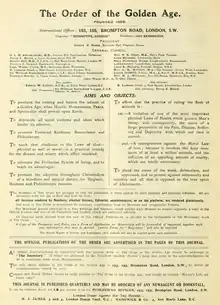Order of the Golden Age
The Order of the Golden Age (OGA) was an international animal rights society with a Christian, theosophical and vegetarian emphasis, which existed between 1895 and 1959.
 Information page about the society in the OGA's journal Herald of the Golden Age, April 1910 | |
| Abbreviation | OGA |
|---|---|
| Formation | 1895 |
| Founders | Henry John Williams |
| Dissolved | 1959 |
| Purpose | Promotion of animal rights |
Region | Worldwide |
History
The Order of the Golden Age (OGA) was founded by Rev. Henry John Williams (younger brother of Howard Williams) in 1882.[1][2] Sidney Hartnoll Beard re-established the OGA in 1895.[1][3]
The renewed OGA's headquarters were located at Beard's residence in Ilfracombe.[4] The Order promoted psychical research, spiritualism and vegetarianism.[1] In 1904, the OGA's new headquarters were located at Barcombe Hall in Paignton.[1][4] Beard was the editor of the Herald of the Golden Age (1896–1918), the official journal for the OGA.[3][5] The aim of the journal was to promote the "fruitarian[lower-alpha 1] system of living, and to teach its advantages."[5] The journal promoted vegetarianism from a Christian perspective.[6] According to an advertisement of the journal, it "challenges the morality of Carnivorous Customs and advocates Practical Christianity, Hygienic Common Sense, Social Reform, Philanthropy and Universal Benevolence. It is opposed to War, Slaughter, Cruelty and Oppression, and is designed to promote Goodness, but not goody goodyism, and Orthodoxy of Heart, rather than Orthodoxy of Creed."[7] Josiah Oldfield, the noted British lawyer, physician and promoter of fruitarianism, was a member of the OGA.[8]
By 1909, the OGA was active in 47 countries, and its headquarters transferred to London.[2] The OGA organised successful concerts at the Royal Albert Hall.[9] The OGA even claimed to have converted Pope Pius X to the vegetarian diet during 1907.[10] In 1938, the Order decamped to South Africa upon the death of their official Founder and President, Sidney Hartnoll Beard, to become forgotten about by the vegetarian movement until the 21st century.
Legacy
A commemorative website was created in 2006 and the OGA was mentioned in a modern published history of the vegetarian movement a year later.[1][2] A large collection of volumes of The Herald of the Golden Age were digitised by the Internet Archive in 2008.
See also
Notes
- At the time, the term 'fruitarian' was used with a variety of meanings, see e.g. "Oldfield's type of 'fruitarian dietary' was not a strict type of fruitarianism".
References
- Gregory, James. (2007). Of Victorians and Vegetarians: The Vegetarian Movement in Nineteenth-Century Britain. Tauris Academic Studies. p. 109. ISBN 978-1-84511-379-7
- Gilheany, John M. "The Order of the Golden Age: An Overview". The Order of the Golden Age. Retrieved 2 October 2022.
- Anonymous. (1978). Who Was Who Among English and European Authors, 1931-1949. Volume 1. Gale Research Company. p. 114. Open Library Ref: OL21034929M; ISBN 0810304007 ISBN 978-0810304000
- "Sidney H. Beard (1862-1938)". Order of the Golden Age. Retrieved August 10, 2019.
- Kuhn, Philip. (2017). Psychoanalysis in Britain, 1893–1913: Histories and Historiography. Lexington Books. pp. 73-74. ISBN 978-1498505222
- Stark, James F. (2018). Replace them by Salads and Vegetables: Dietary Innovation, Youthfulness, and Authority, 1900–1939. Global Food History 4 (2): 130-151. Accessed 28 December 2019
- Kuhn, Philip. (2017). Psychoanalysis in Britain, 1893–1913: Histories and Historiography. Lexington Books. p. 93. ISBN 978-1498505222
- Bates, A. W. H. (2017). Anti-Vivisection and the Profession of Medicine in Britain: A Social History. Palgrave Macmillan. p. 72. ISBN 978-1-137-55696-7
- The Times, Tuesday, Nov 01, 1910; p. 16; Issue 39418.
- The Herald of the Golden Age, July 1907, p. 132.
Further reading
- Gilheany, John M. (2010). Familiar Strangers: The Church and the Vegetarian Movement in Britain (1809-2009). Cardiff: Ascendant Press. ISBN 978-0-9552945-1-8.
- Calvert, Samantha Jane (2013). Eden's diet: Christianity and vegetarianism 1809 – 2009 (PhD thesis). University of Birmingham.
- Bates, A. W. H. (2017), Bates, A.W.H. (ed.), "A New Age for a New Century: Anti-Vivisection, Vegetarianism, and the Order of the Golden Age", Anti-Vivisection and the Profession of Medicine in Britain: A Social History, The Palgrave Macmillan Animal Ethics Series, London: Palgrave Macmillan UK, pp. 69–98, doi:10.1057/978-1-137-55697-4_4, ISBN 978-1-137-55697-4
External links
- Order of the Golden Age
- The Herald of the Golden Age - International Association for the Preservation of Spiritualist and Occult Periodicals